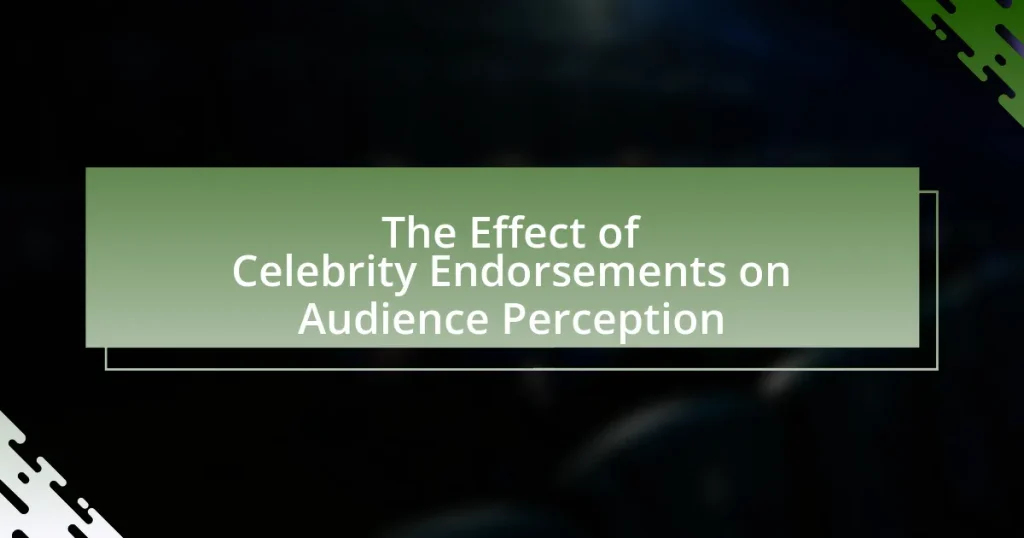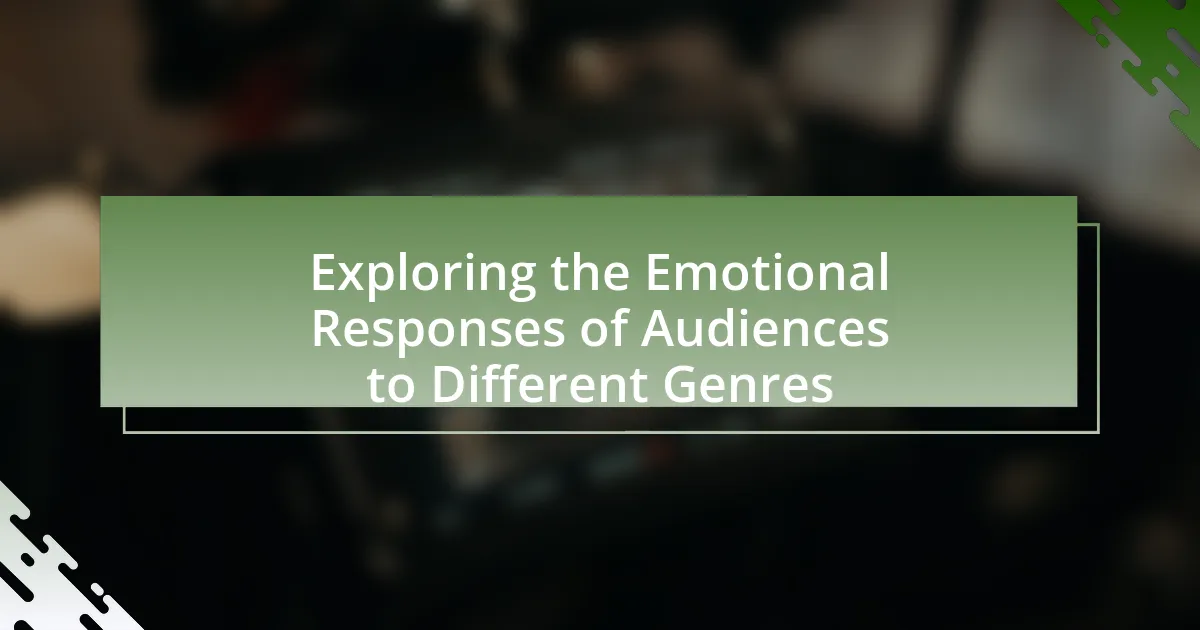Celebrity endorsements are marketing strategies where well-known individuals promote products or services to influence consumer behavior, enhancing brand visibility and trust. The article explores how these endorsements impact consumer behavior through psychological mechanisms such as social proof and identification, emphasizing the importance of celebrity characteristics and alignment with brand values. It also addresses the potential risks associated with celebrity endorsements, including damage to brand reputation and consumer trust, while highlighting current trends like the rise of micro-influencers and the role of social media in shaping audience perceptions. Additionally, best practices for leveraging celebrity endorsements and strategies for measuring their effectiveness are discussed, providing a comprehensive overview of their influence on audience perception.

What are Celebrity Endorsements and Their Purpose?
Celebrity endorsements are marketing strategies where well-known individuals promote products or services to influence consumer behavior. The primary purpose of these endorsements is to leverage the celebrity’s popularity and credibility to enhance brand visibility and trust, ultimately driving sales. Research indicates that consumers are more likely to purchase products endorsed by celebrities due to perceived quality and social proof, as evidenced by a study published in the Journal of Advertising Research, which found that 70% of consumers trust product recommendations from celebrities.
How do celebrity endorsements influence consumer behavior?
Celebrity endorsements significantly influence consumer behavior by enhancing brand credibility and increasing purchase intentions. Research indicates that consumers are more likely to trust and buy products endorsed by celebrities due to the perceived expertise and attractiveness of the endorser. For instance, a study published in the Journal of Advertising Research found that 70% of consumers reported a higher likelihood of purchasing a product when it was endorsed by a celebrity they admired. This effect is further amplified when the celebrity’s image aligns with the brand’s values, leading to stronger emotional connections and brand loyalty among consumers.
What psychological mechanisms are at play in celebrity endorsements?
Psychological mechanisms in celebrity endorsements include social proof, identification, and the halo effect. Social proof occurs when consumers perceive a product as desirable because a celebrity endorses it, leading to increased trust and credibility. Identification happens when consumers relate to the celebrity, fostering a sense of connection that influences their purchasing decisions. The halo effect refers to the tendency to attribute positive qualities of the celebrity to the endorsed product, enhancing its appeal. Research by Ohanian (1990) in the Journal of Advertising found that perceived expertise and trustworthiness of celebrities significantly impact consumer attitudes and purchase intentions, validating these psychological mechanisms.
How do celebrity characteristics affect audience perception?
Celebrity characteristics significantly influence audience perception by shaping how individuals relate to and trust the endorsed products or messages. For instance, traits such as attractiveness, credibility, and relatability enhance the effectiveness of endorsements, leading to increased consumer trust and purchase intention. Research by Ohanian (1990) in the Journal of Advertising found that perceived expertise and trustworthiness of a celebrity positively correlate with audience attitudes toward the endorsed brand. This indicates that when celebrities possess favorable characteristics, audiences are more likely to view the endorsement positively, thereby affecting their purchasing decisions.
Why do brands choose celebrities for endorsements?
Brands choose celebrities for endorsements primarily to leverage their influence and reach, which can significantly enhance brand visibility and credibility. Celebrities often possess a strong fan base and public recognition, making them effective in capturing consumer attention. Research indicates that 70% of consumers are more likely to purchase a product endorsed by a celebrity they admire, demonstrating the persuasive power of celebrity endorsements. Additionally, celebrities can evoke emotional connections and associations with the brand, further driving consumer engagement and loyalty.
What factors influence the selection of a celebrity for a brand?
The selection of a celebrity for a brand is influenced by factors such as the celebrity’s relevance to the target audience, their public image, and the alignment of their values with the brand’s identity. Relevance ensures that the celebrity resonates with the demographic the brand aims to reach, while a positive public image can enhance brand perception. Additionally, when a celebrity’s values align with those of the brand, it fosters authenticity, which is crucial for effective endorsements. Research indicates that consumers are more likely to trust and engage with brands that feature celebrities who share similar values, as seen in a study published in the Journal of Advertising Research, which highlights the importance of congruence between celebrity and brand attributes in driving consumer behavior.
How does the alignment between a celebrity and a brand impact effectiveness?
The alignment between a celebrity and a brand significantly enhances the effectiveness of marketing campaigns. When a celebrity’s image, values, and audience resonate with the brand’s identity, it fosters authenticity and trust, leading to higher consumer engagement. For instance, a study published in the Journal of Advertising Research found that congruence between a celebrity and a brand can increase purchase intentions by up to 50%. This alignment not only boosts brand recall but also positively influences consumer attitudes, as seen in campaigns featuring athletes endorsing sports apparel, where their credibility and expertise reinforce the brand’s message.

What is the Impact of Celebrity Endorsements on Audience Perception?
Celebrity endorsements significantly enhance audience perception by increasing brand credibility and influencing consumer behavior. Research indicates that 92% of consumers trust recommendations from individuals over traditional advertising, highlighting the persuasive power of celebrities. Furthermore, a study published in the Journal of Advertising Research found that celebrity endorsements can lead to a 20% increase in purchase intent, demonstrating their effectiveness in shaping audience attitudes toward products. This impact is largely attributed to the perceived expertise and relatability of celebrities, which fosters a positive association with the endorsed brand.
How do celebrity endorsements shape brand image?
Celebrity endorsements significantly shape brand image by leveraging the popularity and credibility of the celebrity to influence consumer perceptions. When a well-known figure endorses a product, it often leads to increased brand recognition and can enhance the perceived quality of the product, as consumers tend to associate the positive attributes of the celebrity with the brand. Research indicates that 49% of consumers are more likely to purchase a product when it is endorsed by a celebrity they admire, demonstrating the direct impact of celebrity influence on consumer behavior. Additionally, a study published in the Journal of Advertising Research found that brands endorsed by celebrities experience a 20% increase in brand recall compared to those without endorsements, further validating the effectiveness of this marketing strategy in shaping brand image.
What role does credibility play in shaping audience perception?
Credibility significantly influences audience perception by establishing trust and authority. When a source, such as a celebrity, is perceived as credible, audiences are more likely to accept their endorsements and messages. Research indicates that 92% of consumers trust recommendations from individuals over brands, highlighting the importance of credibility in shaping perceptions. This trust leads to increased engagement and a higher likelihood of purchasing decisions influenced by the endorsed products or services.
How does audience familiarity with a celebrity affect their perception of the brand?
Audience familiarity with a celebrity significantly enhances their perception of the brand associated with that celebrity. When audiences are familiar with a celebrity, they are more likely to trust and relate to the brand, as the celebrity’s established reputation can transfer positive attributes to the brand. Research indicates that consumers often perceive endorsed products as more credible and desirable, leading to increased purchase intentions. For instance, a study published in the Journal of Advertising Research found that familiarity with a celebrity endorser positively correlates with brand attitude and purchase intention, demonstrating that well-known celebrities can effectively influence consumer behavior and brand perception.
What are the potential risks associated with celebrity endorsements?
The potential risks associated with celebrity endorsements include damage to brand reputation, loss of consumer trust, and financial implications. When a celebrity engages in controversial behavior or makes negative headlines, the associated brand can suffer reputational harm, as seen in cases like the fallout from Tiger Woods’ personal scandals, which negatively impacted brands he endorsed. Additionally, if consumers perceive a disconnect between the celebrity’s image and the product, it can lead to skepticism and diminished trust in the brand, as evidenced by studies showing that authenticity is crucial for effective endorsements. Financially, brands may face losses if the endorsement does not translate into increased sales, which can occur if the celebrity’s appeal wanes or if the target audience does not resonate with the celebrity’s persona.
How can a celebrity’s negative behavior impact brand perception?
A celebrity’s negative behavior can significantly damage brand perception by leading consumers to associate the brand with the celebrity’s actions. When a well-known figure engages in controversial or unethical behavior, studies show that 52% of consumers are less likely to purchase products endorsed by that celebrity, as reported by the Journal of Advertising Research. This negative association can result in decreased brand loyalty and trust, ultimately affecting sales and market position. Brands may also face backlash on social media, amplifying the impact of the celebrity’s actions and further tarnishing their reputation.
What happens when a celebrity endorses multiple competing brands?
When a celebrity endorses multiple competing brands, it can lead to consumer confusion and diminished brand loyalty. This occurs because consumers may struggle to associate the celebrity with a single brand, which can dilute the effectiveness of the endorsements. Research indicates that when celebrities are perceived as inauthentic or opportunistic due to endorsing rival products, it can negatively impact their credibility and the brands they represent. For instance, a study published in the Journal of Advertising found that consumers are less likely to trust a celebrity who endorses competing products, leading to a decrease in purchase intentions for those brands.

What are the Trends in Celebrity Endorsements?
Trends in celebrity endorsements include the rise of micro and nano influencers, increased authenticity and relatability, and a focus on social issues. Micro and nano influencers, who have smaller but highly engaged followings, are becoming preferred choices for brands as they often yield higher engagement rates compared to traditional celebrities. A study by the Digital Marketing Institute found that 82% of consumers are more likely to trust a brand when it is endorsed by a micro-influencer. Additionally, consumers increasingly favor endorsements that reflect genuine connections and shared values, leading brands to prioritize authenticity in their campaigns. Furthermore, celebrities are increasingly aligning with social causes, as seen with campaigns like Nike’s partnership with Colin Kaepernick, which resonated with audiences and sparked significant discussions around social justice. These trends indicate a shift towards more personalized and socially conscious marketing strategies in celebrity endorsements.
How has social media changed the landscape of celebrity endorsements?
Social media has transformed the landscape of celebrity endorsements by enabling direct interaction between celebrities and their audiences, thereby increasing engagement and authenticity. This shift allows celebrities to promote products in a more personal and relatable manner, often through platforms like Instagram and TikTok, where they can share real-time experiences and behind-the-scenes content. According to a 2021 survey by Influencer Marketing Hub, 90% of marketers reported that influencer marketing, which heavily relies on social media, has been effective for their brands, highlighting the growing importance of these platforms in shaping consumer perceptions.
What is the role of influencers in modern celebrity endorsements?
Influencers play a crucial role in modern celebrity endorsements by bridging the gap between brands and consumers through authentic engagement. They leverage their personal brand and follower trust to promote products, often resulting in higher engagement rates compared to traditional celebrity endorsements. Research indicates that 49% of consumers depend on influencer recommendations when making purchasing decisions, highlighting their significant impact on audience perception. Influencers can create relatable content that resonates with their audience, making endorsements feel more genuine and effective, thus enhancing brand loyalty and driving sales.
How do audience demographics influence the effectiveness of celebrity endorsements on social media?
Audience demographics significantly influence the effectiveness of celebrity endorsements on social media by determining how relatable and credible the celebrity appears to different segments of the audience. For instance, younger audiences may respond more positively to endorsements from celebrities who are popular within their age group, as they perceive these figures as more authentic and relevant. Research indicates that 67% of millennials are more likely to purchase a product endorsed by a celebrity they admire, highlighting the importance of aligning celebrity choice with the target demographic. Additionally, factors such as gender, ethnicity, and socio-economic status can affect how endorsements are received; for example, female consumers may be more influenced by endorsements from female celebrities, as they often seek representation and relatability in marketing. Thus, understanding audience demographics is crucial for brands to maximize the impact of celebrity endorsements on social media.
What are the best practices for leveraging celebrity endorsements?
The best practices for leveraging celebrity endorsements include selecting a celebrity whose image aligns with the brand values, ensuring authenticity in the endorsement, and engaging the celebrity in a way that resonates with the target audience. Research indicates that 67% of consumers are more likely to purchase a product endorsed by a celebrity they admire, highlighting the importance of alignment and authenticity. Additionally, utilizing social media platforms for endorsements can amplify reach, as 49% of consumers trust influencer recommendations, according to a study by Nielsen. Therefore, brands should focus on strategic alignment, authenticity, and effective engagement through relevant channels to maximize the impact of celebrity endorsements.
How can brands measure the effectiveness of celebrity endorsements?
Brands can measure the effectiveness of celebrity endorsements through various metrics such as sales data, brand awareness surveys, and social media engagement analytics. By analyzing sales figures before and after the endorsement, brands can determine the direct impact on revenue. Additionally, conducting surveys to assess changes in brand perception and awareness among target audiences can provide insights into the endorsement’s effectiveness. Social media metrics, including likes, shares, and comments related to the endorsement, can also indicate audience engagement and sentiment. Research indicates that celebrity endorsements can increase brand recall by up to 20%, demonstrating their potential effectiveness in influencing consumer behavior.
What strategies can brands use to mitigate risks associated with celebrity endorsements?
Brands can mitigate risks associated with celebrity endorsements by conducting thorough background checks on the celebrity, establishing clear contractual agreements, and diversifying their endorsement portfolio. Background checks help identify any potential controversies or past behaviors that could negatively impact the brand’s image, as seen in cases where celebrities faced backlash for personal conduct. Clear contractual agreements outline expectations and responsibilities, ensuring that both parties understand the terms of the endorsement, which can prevent misunderstandings and legal issues. Additionally, diversifying the endorsement portfolio by collaborating with multiple celebrities reduces reliance on a single individual, thereby minimizing the impact of any one celebrity’s negative actions on the brand’s reputation. This strategy is supported by research indicating that brands with a diverse range of endorsements experience less volatility in public perception during celebrity scandals.
What practical tips can brands follow when considering celebrity endorsements?
Brands should ensure that the celebrity they choose aligns with their values and target audience to maximize the effectiveness of endorsements. This alignment enhances authenticity, which is crucial as studies show that 70% of consumers are more likely to trust a brand when they feel a connection with the endorser. Additionally, brands should evaluate the celebrity’s public image and past behavior, as negative associations can harm brand reputation. Research indicates that 60% of consumers have changed their opinion about a brand due to a celebrity’s controversial actions. Finally, brands should consider the celebrity’s engagement with their audience on social media, as higher engagement rates can lead to increased brand visibility and consumer trust.




